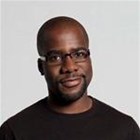Nick Halsey (Will Ferrell) isn't having a good day. After 16 years of valuable work as a salesman, he's unexpectedly fired. Well, I suppose it was bound to happen given his increasing habit of drinking on the job. The same goes for his marriage. When he gets home (with two six packs of beer), all his things are on the front lawn. His wife has left and she's changed all the locks. Oh, and she's frozen the accounts so he can't get any cash. And you thought you had it rough!
At first, all Nick wants to do is camp outside in his La-Z-Boy and drink himself into a happy coma. What other choice does he have? But when the cops give him a maximum of five days to hold a yard sale before he's sent to jail, he finally starts getting his act together. He finds help from an African-American boy (Christopher Jordan Wallace) who simply wants to learn how to play baseball and a pregnant woman (Rebecca Hall) who just moved in across the street. Yes, Nick is initially unwilling to let go of his things, but he soon comes to realise there's a lot more to life than stuff.
Toned down Ferrell
If you come to this movie hoping to see the same outrageous guy that Will Ferrell has played in previous roles, prepare to be disappointed. He's not here. Still, I really liked seeing him toned down for a change, just like he was in Stranger Than Fiction. Who knew the guy could actually show some emotion, as he did in a number of scenes in which he almost cried, but never quite did? Time will tell if he can successfully make the switch from comedy to drama or if he'll end up back in silly roles like poor Jim Carrey.
All in all, I really enjoyed Everything Must Go. Despite a few mistimed jokes that wiped away all the emotion that had been created in a previous scene, first-time director Dan Rush did an impressive job. I haven't read "Why Don't You Dance?" (the short story by Raymond Carver that was the basis for the script) so I'm not sure if the ending was meant to be so unresolved. Then again, I suppose the movie wasn't really aiming for a neat conclusion in the first place. Nick's journey only begins when the yard sale ends.
Deeper message
What I enjoyed most about this movie was the deeper message. It's about how we fill our lives with stuff, thinking it somehow defines who we are. And I'm not just talking about physical things; I'm talking about all the emotional 'stuff' as well.
So many of us go into relationships and completely lose ourselves. We become nothing more than so-and-so's boyfriend, girlfriend, husband, or wife. It's the same with our careers. One of the first questions you're asked when you meet someone new is what you do for a living. I'm a doctor. I'm a lawyer. I'm a teacher. I'm a writer. Suddenly our roles become who we are. But they aren't. That's what Nick slowly comes to realise after losing his job and his wife. He initially feels that he's somehow lost himself. That's why he holds on to his physical property so tightly. It's all he has left. And yet that stuff turns out to be even emptier than his relationship and career. This realisation is the only way he's able finally to let go of even the things he cherishes most.
The "if only" game
I really hope people will see this movie and start to think more deeply about their own lives. Why do we keep playing the "if only" game, thinking everything will somehow be better if we could just find the perfect partner or the perfect job? And why do we keep buying stuff in the hope that it will somehow fill a void when we know it won't?
Perhaps all the promises we made to spend wisely thanks to the recession were as empty as drunken New Year's resolutions to use the gym. Deep down, we're still driven by greed and fear. And it's our mentality of scarcity and competition that makes us act in crazy ways. It's why a Wal-Mart employee was crushed to death by a horde of rabid shoppers at a Thanksgiving sale in 2008. It's also why the store reopened for business as usual later that day.
Things you don't need
Ultimately, it's a waste to spend money you don't have buying things you don't need to create impressions that don't last on people who don't matter. Besides, sometimes the most valuable things in life don't even cost a cent. The best gift I ever received was a handmade birthday card from my best friend. Even though it was just a folded piece of paper with quirky drawings on the front, it meant a lot that someone had taken the time to create something you can't find on a shelf.
There really is no need to feel afraid that we'll somehow stop existing when we let go of our roles or our things. We won't. There's also no need to keep clinging to the idea of what life is supposed to be like in the present or what it could have been like if things were different in the past (as Nick did when reconnecting with a girl from his high school). That's because what we do and what we have are not the same as who we are. Sometimes the only way to understand that is to let go of everything else. What you're left with is usually more than enough.
Rating: 3.5 out of 5
Running Time: 1 hour, 38 minutes
Age Restriction: 10 (L)
































